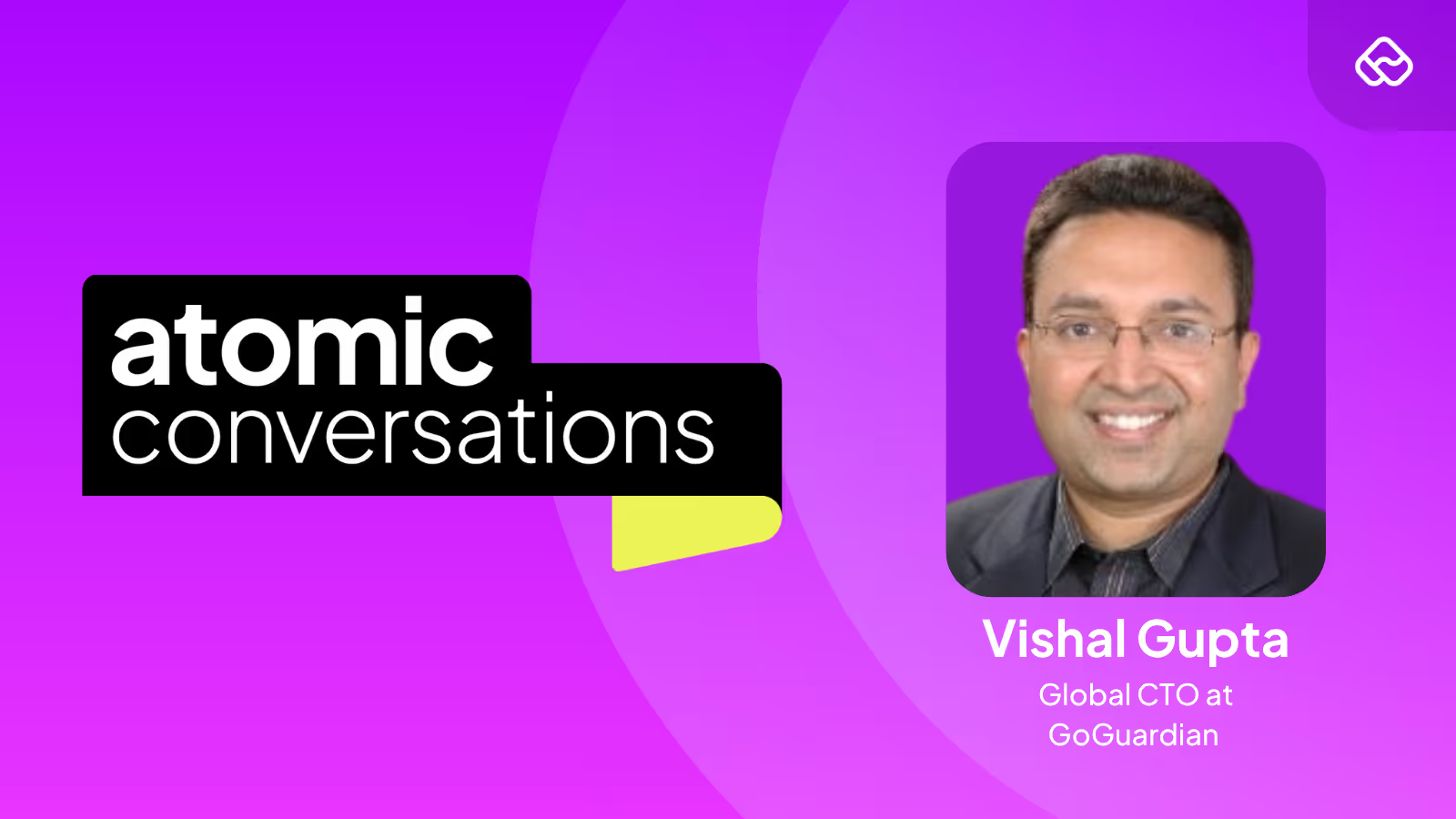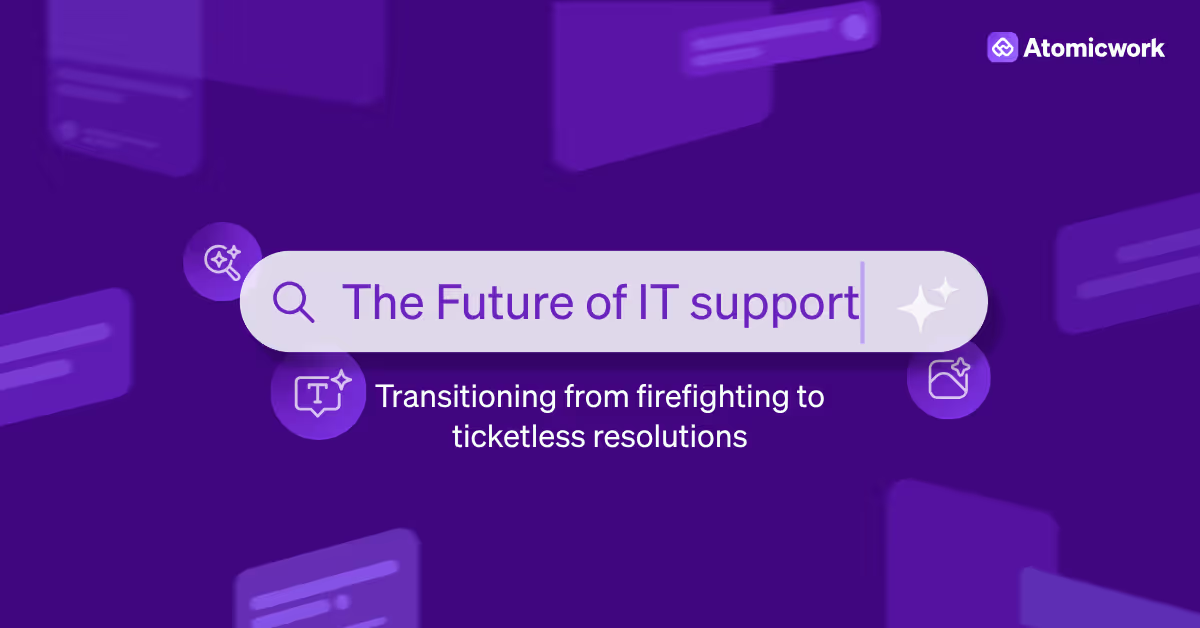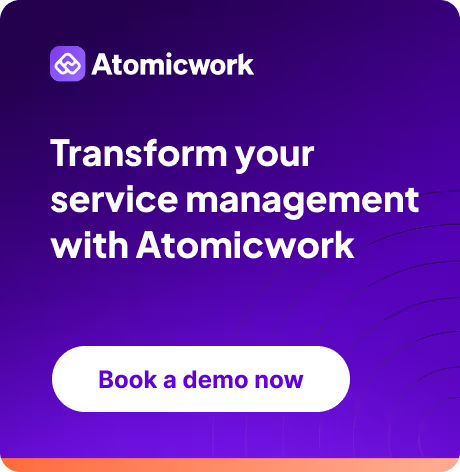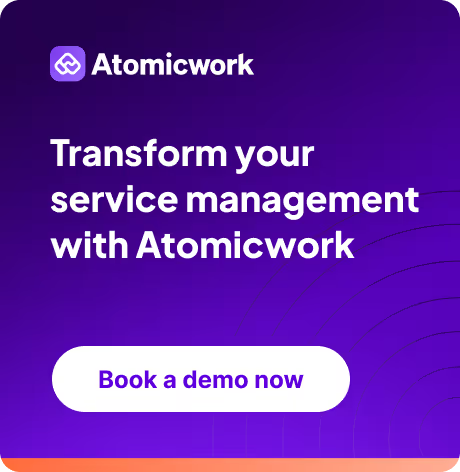Why CIOs are at the center of enterprise AI adoption ft. Vishal Gupta

I recently had the privilege of hosting Vishal Gupta, former CIO & CTO at Lexmark (part of Xerox), and presently the CTO of GoGuardian, on Atomic Conversations.
With over three decades in technology, spanning roles at Cisco, Symantec, and others, Vishal’s insights challenged my thinking about AI transformation, leadership, and the evolving role of the CIO. We conducted the interview when he was still with Lexmark.
Watch our conversation here or catch the key highlights below.
The once-in-a-lifetime opportunity with AI
Vishal Gupta has seen every major tech wave since 1992—the dot-com boom, mobile revolution, cloud transformation. So when he said this, I listened: “I have never seen an opportunity like this, and I have seen a lot of them.”
GenAI certainly isn’t another tech wave. He positioned generative AI as fundamentally different from mobile or cloud, describing it as a quantum leap comparable to the industrial revolution. This is not an ‘incremental’ change; it is a once-in-a-lifetime transformational change.
The kind of change that happens once every 40-50 years. The question is whether we’re equipped to take advantage of it.
So how do you actually prepare for this?
A 3-step framework for CIOs to drive AI adoption
When I asked Vishal about his philosophy for AI adoption at Lexmark, he outlined a framework that felt immediately actionable.
1. Talent: Train everyone, not just IT
I was surprised to learn that when Vishal joined Lexmark in February 2021, they had just five people who were trained in data science. He quickly partnered with North Carolina State’s AI Academy to train 100 people across the organization, not just in IT, but in finance, sales, marketing, and manufacturing.
The training wasn't a weekend workshop. It was 3 hours a day for an entire year, across six cohorts.
Why train people outside IT? Because, as Vishal explained, the CFO’s team knows their most critical use case better than anyone else. In their case: cash flow prediction. If you only train IT people, you’ll only solve IT problems.
It doesn’t matter what field you’re in. You might be in HR. AI is going to 100% change everything. It already is.
2. Alignment: Create executive buy-in
Vishal established a council where each C-level executive nominated a VP representative. This was about creating trust and shared ownership. His insight here was profound: your biggest strength as an executive isn’t your knowledge, it’s your ability to collaborate.
3. Data: Build competitive advantage
With talent and alignment, you can identify use cases. But data is what creates competitive advantage. Lexmark invested heavily here, recognizing that even the best AI strategy fails without quality data.
Vishal shared two concrete examples to demonstrate the power of focused AI application:
RFP response automation: Lexmark had 40 people handling RFPs, but they needed two weeks per response. Many opportunities were declined due to time constraints. After training an AI system on past RFPs, they saw a 30% productivity increase and could respond to opportunities they previously had to decline.
Toner authentication: In an industry where high-margin toner cartridges are often counterfeited, Lexmark used AI to detect fake toner at the cartridge and account level.
The result, you ask?
Over $15 million in revenue at very high margins.
The pattern? Both cases had existing data, clear business value, and the potential for 7-8 figure impact.
The converging role of the CIO
One thread that emerged throughout our conversation was convergence, of IT and product development, of security and software, of technology and business strategy.
Vishal’s dual role as CIO and CTO in Lexmark reflects a fundamental shift:
In the past, we used to have technology companies and non-technology companies. Now we’re going to have more and more technology companies and technology-enabled companies.
He described how DevOps has merged development and operations, how cybersecurity spans both IT and product, and how AI requires both sides of the house to work together. At Lexmark, this convergence created critical mass, i.e. enough people working on cloud, security, and AI to train, rotate, and develop as a unified community.
His prediction is that the CIO’s job is becoming more like the CEO’s. The CIO has to now work across every function to determine which work should be done by humans, which by AI agents, and how to orchestrate them effectively.
How startups can turn size into an advantage
As an advisor to many startups (including Atomicwork), Vishal offered a counterintuitive perspective: smaller companies may actually have the advantage in the AI era.
Why?
Startups are naturally more agile and forward-thinking. They haven’t accumulated legacy systems or mindsets that need changing. They can be ‘AI native’ from day one without the burden of change management.
“If you’re a smaller company, you can actually become much more AI native because of your change management. You can start in the optimal way from day one.”
With AI transformation, size can be an asset if you frame it correctly. You can make your problem into an opportunity.
Leadership by example and the ‘Socrates’ method
When I asked about upskilling leadership, Vishal shared a powerful story about leading by example.
At a company meeting in 2024, Lexmark’s CEO Allen Waugerman delivered an opening speech that received a standing ovation. Then he revealed: ChatGPT wrote the entire thing, trained on his last four board presentations. The room went silent, then came the realization: if he can do it, we can do it.
That story perfectly illustrates what Vishal called the most important truth about leadership: people follow what leaders do, not just what they say.
But Vishal’s own leadership evolution reveals something even more nuanced. Given that he’s worked with senior and experienced leaders, he’s shifted from giving answers to practicing the ‘Socrates method’: asking the right questions instead.
“You know, they say the best way is not to give the answer but ask the right questions.”
The idea is to create a decentralized organization where he’s not at the center of every decision. The insight that struck me most: “Nobody learns to cycle or swim by not falling or not momentarily panicking.” Growth requires letting people find their own answers, even if they don’t get it fully right the first time.
A work of wisdom for emerging IT leaders
When I asked Vishal what young IT leaders should focus on, I expected a technical answer. Instead, he talked about wellness, continuous learning, and the discipline of focus. He mentioned how physical and mental agility go hand in hand and also urged continuous learning, dedicating 1-2 hours per week minimum.
What struck me most about this conversation was his emphasis on people, alignment, and fundamentals in an age of rapid change. He reminded me that while the tools may be new, the principles of good leadership remain constant.
At the end of our conversation, I found myself returning to Vishal’s opening statement: we’re living through a once-in-a-lifetime moment. The question isn’t whether AI will transform your organization, that’s already happening.
The real question is whether you’re willing to truly grasp this opportunity with both hands.
You can listen to our entire conversation here.
You may also like...

































